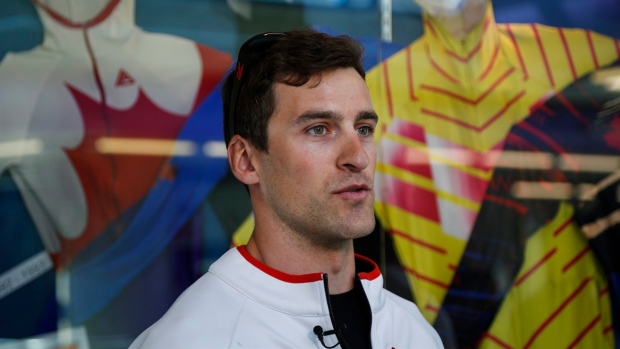May 3, 2016
Olympian Morrison taking things slow after stroke
Sleep and more sleep is what Olympic speed skater Denny Morrison is doing these days while recovering from a stroke. Morrison will continue to take it easy for six weeks before deciding on his next steps.
The Canadian Press

CALGARY - Sleep and more sleep is what Olympic speed skater Denny Morrison is doing these days while recovering from a stroke.
"Since I've gotten home, I've been sleeping 10 or 12 hours a night and then having a three-hour nap during the day because I'm exhausted all the time," Morrison said Tuesday while speaking to the media for the first time since his ordeal.
The owner of four Olympic medals, including a team pursuit gold from 2010, flew back to Calgary last week after spending three nights in a Salt Lake City hospital.
Morrison will continue to take it easy for six weeks before deciding on his next steps.
He and girlfriend Josie Spence were en route to Canada on April 30 after mountain biking the Arizona Trail, when the left side of Morrison's face drooped and his speech slurred "like I had 45 shots of whatever."
Spence, also his teammate on the Canadian long-track team, insisted he get to a hospital, which Morrison agrees was "a good move."
His condition initially deteriorated upon arrival, but then improved to the point where an emergency surgery was cancelled.
"It was quite frightening for her as well as for me," Morrison said.
The 30-year-old from Fort St. John, B.C., experienced precursors to the stroke.
"Before the stroke, I had five different episodes where I was going blind in my left eye partially for about 30 minutes and then it would pass," said Morrison, who said he consulted an opthomologist on the condition. "Those can be warning signs for a bigger stroke to come."
Morrison's stroke came almost a year after a near-fatal motorcycle accident in Calgary.
Along with a broken right leg, Morrison sustained a concussion, a punctured lung, a torn anterior cruciate ligament in his knee, bruised liver and kidneys and a small fracture in a bone near his spine when his motorcycle struck a left-turning car May 7.
He didn't compete in any World Cups in 2015-16, but raced for the first time since the accident March 18 at a Canada Cup in Calgary.
"The stroke is sort of a new thing I guess," Morrison said. "This stroke adds a whole new dimension of obstacles and patience to have to wait and re-set all the steps that I'm looking forward to taking to getting back to where I want to be in speed skating."
Morrison won silver and bronze for Canada's only long-track Olympic medals in 2014. He's young and fit, so it's tempting to link the stroke to his motorcycle accident in the absence of a definitive explanation.
What contributed to the stroke remains mysterious, but Utah doctors left Morrison with no doubt that he'd had one.
"The reason is a small tear in the carotid artery that led to the dissection, which is where blood gets between the walls of the artery and can create a bit of an aneurysm there and then small parts of the clot break off and slowly go towards the brain and cause a stroke in this case," Morrison explained.
"I've been told there's evidence that aneurysm is more than two months old. Take from that what you will."
He's drawing inspiration and a possible timetable for a return to training from Pittsburgh Penguins defenceman Kris Letang. The 26-year-old had a stroke in 2014.
Tests determined Letang had a small hole in the wall of his heart. He returned to play in the NHL after a 10-week break.
"That's sort of one of the things I'm dealing with right now is the unknown of these next steps," Morrison said.
"I think every step of the way is going to be cautious like that and taking my time to make sure I'm in 100 per cent good health. It's not a matter of slowing down my injury recovery. It's more a matter of safety and not having another stroke."
Morrison considers himself lucky that he didn't suffer the stroke in the Arizona backcountry kilometres from medical attention. He also feels fortunate to have avoided surgery.
He hopes his luck holds when he has to deal with a U.S. hospital bill that could run over $50,000.
"We're still working on insurance for the medical coverage through Speed Skating Canada," Morrison said. "I'm not really looking forward to receiving the bill in the mail."
